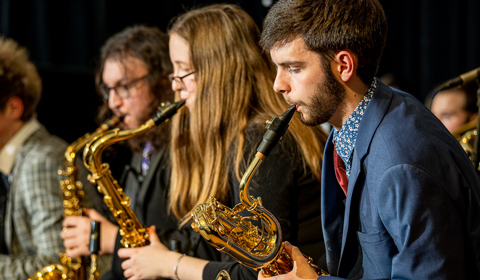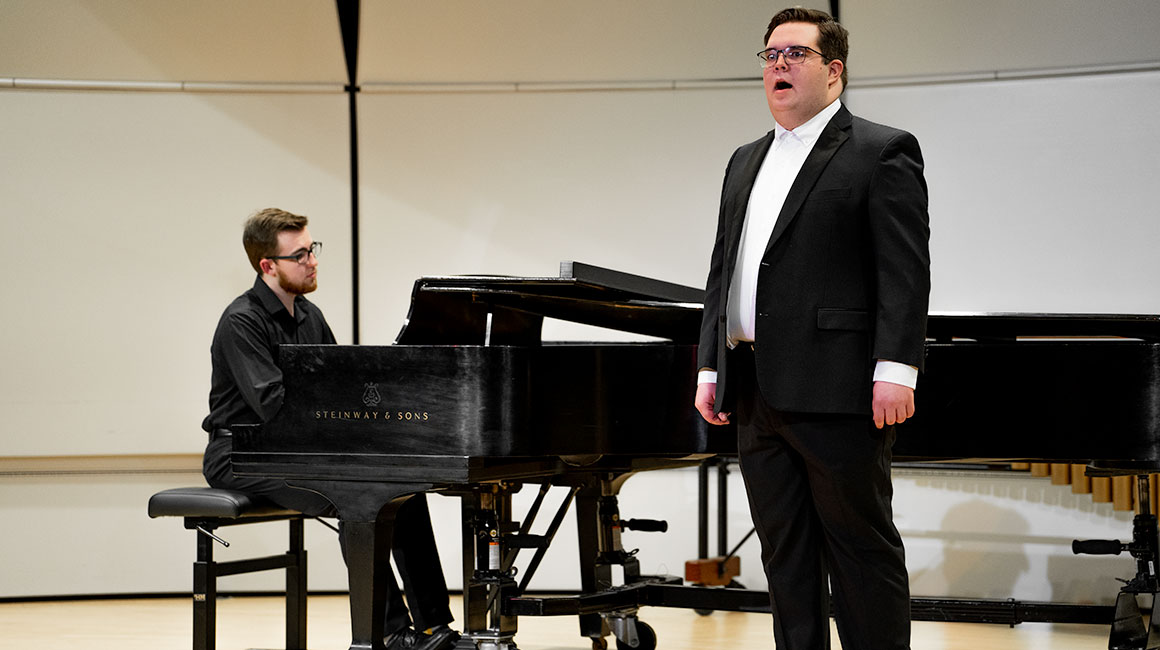Music Performance
A degree in Music Performance provides you with the real-world skills you need for success in a competitive and demanding professional environment. Simply put, you will learn from artist-teachers who are networked into the music industry from New York to LA, from Beijing to Sydney, and across Europe. Work alongside solo artists, recording artists, contractors, entrepreneurs, members of military ensembles, composers and arrangers, and many more.
- Our GRAMMY Award-winning faculty are networked into the international music industry and know exactly what it takes to be successful in careers from the concert hall to the recording studio, sound stage, or outdoor music festival.
- In addition to curricular concerts and events, students have opportunities to perform professionally in multiple ensembles including the Pittsburgh Symphony Orchestra, Pittsburgh Opera and Ballet Orchestras, and Pittsburgh Jazz Orchestra, to name a few.
- Performance majors at both undergraduate and graduate levels have the opportunity to pursue studies in jazz.
- In addition to classroom spaces, the Mary Pappert School of Music has a variety of performance, rehearsal, and practice facilities available for use.
- Our students benefit from master classes presented by internationally-recognized music experts and guest artists.
- Through coursework and internships, performance majors learn to manage the business and promotional aspects of professional music-making.
- Our graduates succeed. They can be found performing virtually every style of music locally, nationally, and around the world.
Auditions & Awards
Admission to the Mary Pappert School of Music also includes a formal audition. Learn more about the audition process & guidelines.
All fully admitted undergraduate music majors are automatically considered for additional Audition and Enhancement Awards, up to and including the Chancellor Award. Each year, this prestigious scholarship is offered to one student in each degree program and covers the complete cost of tuition for up to 8 consecutive semesters.
Program Information
Varied curricula for each applied area—brass, guitar, keyboards, percussion, strings, voice, woodwinds. See catalog for specific details.
Program Type
Major
Degree
Bachelor's
School
Academic Department
Performance (Music)
Duration
4-year
Required Credit Hours
120–138
Modality
In-Person
Jazz
Our unique jazz curriculum integrates foundational training in the classical tradition with private instruction and coursework in jazz idioms.
- We offer performance experiences in both large and small ensemble settings. These include Jazz Ensemble, Jazz Workshop, Vocal Jazz Ensemble, Jazz Guitar Ensemble, and Jazz Chamber Groups. Courses include improvisation, harmony, arranging, ear training, and history.
- The Institute of Entertainment, Music, and Media Arts (IEMMA) allows you to engage in real-world and online activities while connecting creatively with other students and building dynamic relationships with industry-leading professionals.
- Our students receive exposure and training that encompasses commercial music (pop, Latin, and other world music styles), and includes experiences in the recording studio using notation software and digital audio workstations to compose and arrange.
- Duquesne's close association with the Manchester Craftsmen's Guild and nearly a dozen area jazz clubs provides a variety of opportunities for students to perform with and learn from nationally-known visiting artists.
- Our graduates succeed.

Interested in jazz?
Our Jazz Emphasis is designed to equip you to thrive in a variety of professional roles in today's ever-changing world of commercial music, of which jazz is an integral part.
Chair of Performance
Hone Your Performing Skills
Regardless of degree path, each student benefits from one-on-one instruction with our world-class faculty.
Duquesne's ensembles will provide you with the finest university-level performing experiences available, preparing you for your career as a professional musician. As a member, you will perform on campus, as well as at some of the best venues for music in the city. Our students have performed at Heinz Hall, Carnegie Music Hall in Oakland, Soldiers and Sailors Memorial Hall, the August Wilson Center, the Andrew Carnegie Free Library and Music Hall, and many more.
Learn more about jazz at Duquesne.
Learning Outcomes
The music performance department adheres to the School of Music General Outcomes for All Degree Areas as listed on the main Degree page. In addition:
- Students must demonstrate achievement of professional, entry-level competence in the major area, including significant technical mastery, the ability solve professional problems independently, and develop a coherent set of artistic/intellectual goals for the purpose of long-term success in their chosen field.
- Students are expected to have the ability to form and defend value judgments about music and to communicate musical ideas, concepts, and requirements to professionals and laypersons related to the practice of the major field.
- Students must demonstrate understanding of performance practice and historical and social contexts of the musical works of their field.
- Students must demonstrate the ability to conduct theoretical analysis of relevant repertoire, including arranging music for their instrument and/or ensembles.
- Students incorporate relevant technology into degree completion requirements, including recitals, recital program notes, and jury papers.
- Students must demonstrate competency in musicianship skills, including rhythm, aural skills, sightreading, score analysis and reading, and transposition.
- Students must demonstrate a reasonable capacity to improvise as appropriate to the performance practice of selected repertoire.
- Students perform a wide variety of musical styles from various cultures and time periods.
- Students demonstrate research, communication, critical thinking, and problem-solving skills in applied study, ensembles, and academic coursework.
- Students will demonstrate an understanding of sequential pedagogy for beginning and intermediate performers; major schools of philosophy and methodology; teaching techniques and strategies; repertoire and resources; measurement and evaluation of performance; psychological, cognitive, and physiological developmental issues in teaching.



